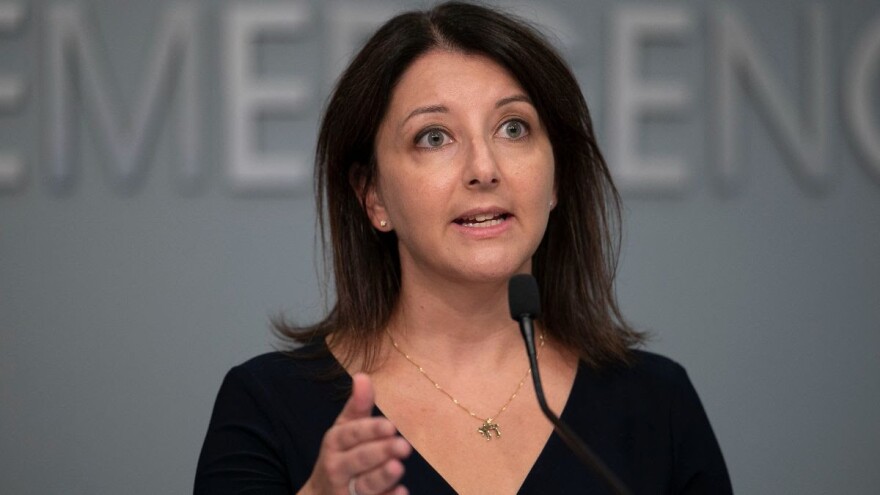After it was reported the Biden administration plans to name Mandy Cohen as the next director of the Centers for Disease Control and Prevention, some conservatives criticized her COVID-19 response as North Carolina’s top health official.
They have characterized her as being too restrictive, and have widely shared a 2022 video in which she talks about how she made some decisions about when and how to reopen the state. Cohen said she often consulted with her counterpart in Massachusetts to see what they were doing.
“When she was like, ‘Are you going to let them have professional football? And I was like, ‘Nope.’ And she was like, ‘Ok neither are we, neither are we,’ ” Cohen said. “So it was conversations like that. Or I’d be like, ‘So when are you going to think about lightening up on that? And they’d be like, ‘Next Monday.’ And I’d be like, ‘next Monday.’ ”
(There was pro football in North Carolina in the fall of 2020, though hardly anyone was allowed to attend games.)
Republican State Treasurer Dale Folwell, who is running for North Carolina governor, wrote on Twitter: “Pray for our country. As a member of the NC Council of State, my observation is that the actions of Dr. Mandy Cohen during Covid resulted in more disease, death, poverty and illiteracy.”
Is that true?
This article, originally published in the Inside Politics newsletter, will look at how North Carolina fared in three areas under Cohen’s leadership during COVID-19.
Deaths. The economy. Education.
On the first two, she fares well. On education, less so.
How many people died?
Instead of counting COVID-19 deaths, I took a different approach and looked at how many excess deaths North Carolina had during the pandemic.
Excess deaths is a metric that looks at how many people typically die in a week or month, and then counts all of the “extra” deaths for any reason — COVID-19, heart attacks, overdoses, suicides, etc.
That helps clear up any confusion as to whether COVID-19 deaths were undercounted or overcounted.
From the start of the pandemic until the end of 2021 (when Cohen stepped down) the United States had 19% more deaths than expected, according to a CDC database.
In North Carolina, there were nearly 17% more deaths than expected.
That was far less than many nearby states, like Georgia (24.6% more deaths than expected), South Carolina (22%), Florida (19.5%) and Tennessee (19%).
Virginia’s increase in excess deaths (15.9%) was smaller than North Carolina's. It was as slow or slower to reopen than North Carolina.
During the first year of the pandemic, Cohen and Gov. Roy Cooper’s strategy seemed to be to let neighboring states reopen first and take the heat from the national media about being reckless with COVID-19.
That strategy may not have been scientific. But fewer people died here than in many states.
Did that hurt the economy?
San Francisco had some of the fewest COVID-19 deaths per capita in the nation. But the city had a severe lockdown and is still struggling to bounce back.
Residents fled. Tech workers haven’t come back to the office. Homelessness increased.
San Francisco’s story was part of a COVID-era exodus of people from states with strict COVID-19 restrictions, such as California and New York, to states that reopened faster, like Florida and Arizona. That trend may have been more about people escaping high housing prices than restrictive COVID-19 policies.
But while some conservatives have criticized Cohen and Cooper’s handling of the pandemic, the state was and still is a destination.
The state’s unemployment rate (3.4%) is lower than the nation's (3.7%). North Carolina was the nation’s ninth-fastest growing state by percentage from 2021 to 2022.
How did children fare?
Cohen and Cooper did not require K-12 public schools to open for in-person instruction at the start of the 2020-21 year. They instead left the decision to individual school districts.
While many Republican-controlled school districts pushed to bring students back as fast as possible, many large urban districts in Democratic-controlled counties did not.
The National Association of Educational Progress is considered the best way to compare how students have fared over time. On the 2022 test, The New York Times reported that “in math, the results were especially devastating, representing the steepest declines ever recorded.”
In North Carolina, the results were often worse.
Among the state’s eighth-graders, for instance, the percentage of students at or above basic levels in math fell 10 percentage points between 2019 and 2022. Only eight states saw larger declines.
North Carolina’s fourth-graders in math also saw larger declines than the national average. The same was true for the state’s fourth- and eighth-graders in reading.
When you look at the individual district level, the situation is even more bleak.
Mecklenburg County, for instance, was remote for almost all of the 2020-21 school year. As WFAE reported in November 2021: ”58% of CMS Black third-graders were proficient in math during the 2018-19 school year. That was higher than 10 other districts in the Charlotte area.
But in 2020-21, the percent of Black CMS third-graders who were proficient in math dropped by 35 percentage points. That was by far the largest drop in the region.”
(Charlotte-Mecklenburg Schools has said it did the best it could in a difficult time and that a large number of students decided to remain online no matter what the district did.)
Cohen and Cooper did not make the Charlotte-Mecklenburg Board of Education have mostly virtual school that year.
But they also didn’t require in-person instruction, either.
That didn’t happen until the summer of 2021, when the GOP-controlled General Assembly passed a bill mandating in-person education.



